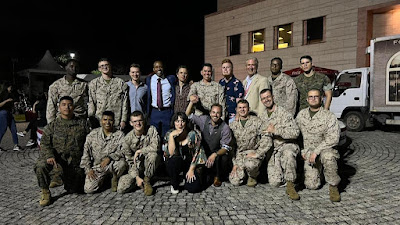The Constantinople Communiqué
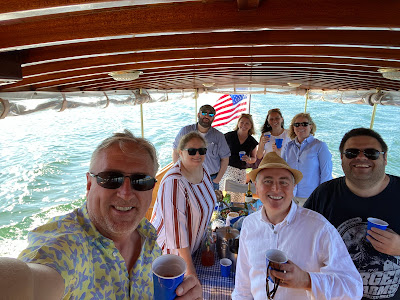 |
All aboard the Hiawatha sailing the Bosporus
with friends from Istanbul and Asmara, Eritrea. The Hiawatha is owned by the US government, operated by the Istanbul American Employee Association, and housed at a local museum where they care for and maintain her for our use each summer. Come and join us! |
Greetings my friends! //
Selamlar arkadaşlarım!
Oh dear, it’s been a bit, hasn’t
it? By my account, more than a year, in
fact. With your permission (although who
am I kidding, if you’re already here, that ship has already sailed, hasn’t it??)
I’ll simply put forward that all-too-common excuse, “Hayatı akşına
bırakıyoruz,” a nice little idiomatic turn of phrase that means we kind
of let life flow on by, a more roundabout way of saying we’ve been a little
busy to get around to an update. Or
maybe too lazy. Either way, it works.
But it’s quite possible you haven’t
really missed hearing from us, and that’s ok, I’ve no doubt the four of you
have also been busy now that life seems to be edging ever more towards an
eventual post-pandemic world.
And so, daha fazla
konuşmadan // without further ado:
Creeping Back to…Something
As was the case the world over as Covid 19 vaccinations were distributed and administered in spring and summer
2021, life here began the creaky process of adjusting to whatever we call this
period that isn’t quite yet post-pandemic. Some restrictions across Turkey continued here
and there into late 2021 and early 2022, while some tightened a bit when case
numbers and death rates crept up. The
gradual lifting continued here until all restrictions were essentially removed
in spring 2022. But the Turkish people
in general were very good at caring for one another by complying with health
and safety rules, and as a result of a pretty well-regarded health care system,
have so far had fewer than 100,000 deaths in a country of about 85 million.
For us, the immediate impact of
reduced or rescinded restrictions meant a return to the office more or less full-time,
with work-from-home on a more occasional basis, and increased travel, both
within Turkey and without. As new
variants emerge (because this virus has proven to do best what viruses do,
which is to keep evolving and adapting, and while we may be done with the
virus, it’s sure not yet done with us), we are sure to see more cases this fall
and winter, but with vaccines as effective as they are, serious illnesses and
death rates should be significantly reduced.
With more than 1 million covid-related deaths in the United States
alone, and more than 6.3 million globally, the world sure could use a break.
Turkish Names, part deux
I’ve shared a bit before about
Turkish naming conventions here, but
that was largely focused on given names.
I also find Turkish surnames quite interesting, and I particularly enjoy
discovering the linguistic meanings associated with the family names of the
people.
Most people know that surnames
have a number of origins such as a long-lost (or sometimes not) profession (Smith,
Cooper, Farmer, etc.), geographic location (called toponymic names, including examples
such as Bridge, Field, Brook, Wood, etc.), sometimes show gender (as in Russian
or many other Slavic women’s names that end in “-ova”) or show both gender and heredity,
such as Icelandic women’s surnames that end in “-dottir” or women in Arabic
speaking cultures whose names include “bint.” And like these as well as names that indicate
“son of” like O’Conner, Johnson, or Arabic names that include “ibn”, Turkish
names often transmit similar meanings.
For example, the President of
Turkey is Recep Tayyip Erdoğan, and his surname means something like brave or
warrior, a particularly apt name if one is trying to front the proposition that
he is a populist fighting for the common man.
The mayor of Istanbul at the moment is Ekrem Imamoğlu whose surname
includes the word “imam” (the word for an Islamic religious figure such as a
worship leader at a mosque), and “-oğlu,” which means “son of” much like stems
“O’-” and “-son,” and so his name means “son of the imam.” Similarly, the current Minister of Foreign
Affairs is Mevlüt Çavuşoğlu, whose surname means “son of the sergeant.” Other interesting surnames include 2006 Nobel
Prize winner in Literature Orhan Pamuk, whose surname means cotton; well-known
industrialist Rahmi Koç, whose surname is the noun ram (the animal, which is also
the symbol of the many companies in his empire); and the surname Karakoç, which
means black ram. Another industrialist
family is Sabancı that includes the prefix “saban,” which means plow or
cultivator, and the suffix “-cı” which indicates a profession or trade, and so
the name becomes something akin to farmer.
The list is pretty much endless, but these are just a handful of
examples. Once you know a little Turkish,
deciphering the literal meaning of names becomes an interesting exercise. Well, it’s interesting to me, anyway.
İyi Bayramlar!
You might recall that the Turkish
language often makes plural any wishes of good things (e.g., greetings such as
good evenings, good days, etc.), and holidays are no exception; therefore,
Turkish speakers will wish one another “İyi Bayramlar,” or “[have] good
holidays.” In fact, the word “bayram” (a
noun in its singular form) means holiday, festival, or holy day, but also
describes the actual holiday as experienced at the very moment it’s being
celebrated, such as this very moment, which is called the Kurban Bayramı, or the
Feast of the Sacrifice.
Kurban Bayramı (or Eid al-Adha
in the transliteration of Arabic) is celebrated throughout the Muslim world,
and is the companion to the other major holiday in the Islamic calendar,
Ramazan – or Şeker – Bayramı (Eid al-Fitr), which marks the end of the holy
month of Ramadan. Similar to the story
in Christianity and Judaism regarding Abraham and his son Isaac, the Quran
relays the story of Abraham as well, although he was to sacrifice his son
Ishmael (rather than Isaac, as is the tradition in the other monotheistic religions),
and this bayram celebrates Abraham’s willingness to sacrifice his son in
obedience to Allah’s command. From
there, Allah provided Abraham with a lamb to substitute for Ishmael due to his
willingness to sacrifice the life of Ishmael, and consequently, Muslims around
the world to this day sacrifice an animal to mark this holy occasion. This year that specific act took place on
Saturday morning July 9.
(None of the pictures that follow are graphic, but of course it doesn't take much imagination to understand what happened. Photo and background credit go to my colleague Eric, who lived in the neighborhood and met many of his neighbors while walking his dog. He shared this about the experience: "As I walked the dog toward Emirgan Park in the morning there were multiple animals tied up at houses and still more we could hear in the distance. All were being cared for and tended to so as not to be stressed. I saw a lot of beauty in it, especially since it is such a working-class - or lower - neighborhood. I drew a lot of parallels to Native Americans, using the entire animal, sharing it for communal good, and connecting to hundreds if not thousands of years of cultural tradition." Eric was invited to join all parts of the Kurban celebration, including the meal with his neighbors.)


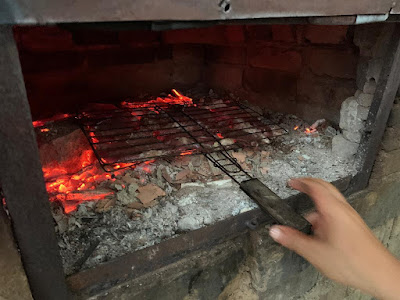

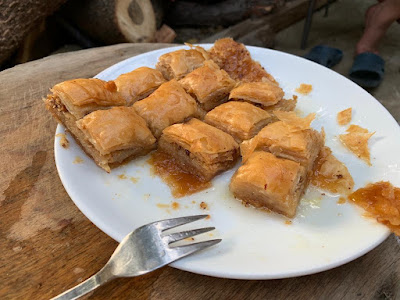
According to Fermat (the
gentleman in the first photo), the cow cost 30,000 Turkish lira (about $1700) and was
to be split by seven families, with extra to be shared with police and others
such as the needy, in accordance with Islamic tradition. Like many major holidays among the religions
of the world, the faithful dress in their finest clothes, gather with their
families and friends, prepare large feasts of meat and special sweets, and attend
prayers together.
This year the Kurban Bayramı
started on Saturday July 9 and ended on Tuesday July 12, but with another
holiday on Friday July 15 (Democracy and National Unity Day, the anniversary of
the failed coup d’état in 2016), the government decreed an extension of the
bayram to include Wednesday and Thursday, giving everyone a full week off. I had nothing planned during that week
because I assumed I would need to work on Wednesday and Thursday, so while the
entire country seemed to have gone on holiday, I hung out with Riley The Wonder
Dog and his buddy Koa.
It was a quiet week.
.HEIC) |
| Riley the Wonder Dog and pal Koa. |
Travel & Visits
The oft discussed pent up demand
to travel has been in oversupply among our Foreign Circus colleagues the past
two years, which makes complete sense.
We’re no different, of course, and as soon as we were vaccinated and able,
we began sorties as long as we could do so safely.
When I reflect on my list of all
the places we managed to go in the past 14 months, I’m pretty amazed, to be
honest, not only about the amount of travel we’ve actually managed, but that we
bothered to try at all. Early on, entry
requirements were kind of a moving, ever evolving target and necessitated
flexibility and multiple contingency plans.
For example, we needed a plan in case we were turned away by immigration
authorities in another country if they didn’t recognize or understand our
vaccine certificate (not an issue for domestic travel within Turkey). Most of the European Union used a unified
system called a “Green Pass,” a QR code directly linked to proof of vaccination
by an EU health authority, but most countries still had testing and entry
requirements that varied from place to place.
We were vaccinated at the US Consulate and have a CDC card and QR code, but
that was not recognized by the technology used in Europe that scans QR codes as
it wasn’t linked to a Green Pass. Most
countries also required proof of a negative PCR test (and later, just a
negative antigen test) for entry (fortunately pretty easy to get here), and
Turkey required negative tests before boarding to return, which necessitated
locating a reputable testing center that could provide results by email or text
within the time restrictions before boarding our return flight. And what if we
tested positive? We needed a plan for
that, too, particularly for Riley The Wonder Dog who, of course, remained in
Istanbul with friends. Every time we
made plans to travel, we checked, then double- and triple-checked requirements,
searched for locations in the destination city where we could get tests, emailed
hotels about conditions in the city, and scoured airline and ministry of health
websites for changes.
We really had our work cut out
for us if we hoped to travel at all, but with Tommy living and attending grad
school in Bologna, we had a pretty solid incentive to find a way to do so. But our first trip outside of Turkey was a
bit of an experiment in testing airport, airline, hotel, national and other
restrictions. Italy wasn’t yet an option
for those of us living in Turkey, nor were many other popular
destinations. After ten months at post
with little travel other than two local road trips within Turkey and one emergency
trip home to the US when Kate’s mom passed away, and after having had our first
vaccine, we chose to give Dubai a shot (haha).
Our assumption was that their well-developed tourism and health care sectors,
together with never having completely closed their borders, meant we could easily
find all the services needed for PCR tests and efficient delivery of results before
boarding our flight. We also knew it
would be relatively easy to find a nice hotel with good amenities that would
mean we could basically stay put, reducing our exposure and risk. And so that’s what we did, and we spent a long
weekend in Dubai lounging poolside with books and cocktail delivery, trying to
avoid the convection oven-like temperatures, and dining at one of the many
largely empty restaurants on the hotel grounds.
We did venture out to an Italian restaurant one night, conveniently
located in the shadow of the Burj Khalifa, to celebrate our 32nd wedding
anniversary, but mostly we just hung out poolside.
 |
| Walking in the heat among the tall buildings. |
 |
| Anniversary #32 dinner. Still hot out at 9:00 pm. |
 |
| Pre-dawn boarding. The pilot took the photo as we were just lifting off, then ran to board himself, which was not at all worrisome. |
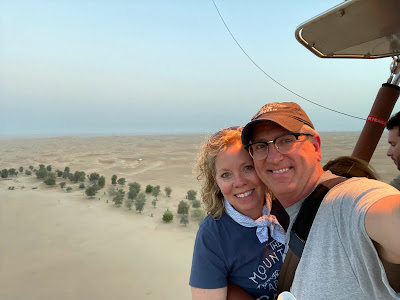 |
| Early morning flight over the desert about 90 minutes east of Dubai. |
 |
| Ships of the desert. |
 |
Totally not a staged photo.
|
 |
| Sunset over the Persian Gulf. |
Once the seal was broken and we learned more about how to navigate and
negotiate the various systems, expectations, and restrictions around the region
(and especially after vaccinations began in March 2021), we were off to the
races. In the months since that trip to
Dubai in May 2021, we returned to the US for Kate’s mom’s memorial service, and
included stops in Minnesota and Washington; visited Tommy for weekends in Italy
three times and Brussels once; spent a week in Greece to see Athens, Santorini,
and Hydra; enjoyed a week driving a 1968 MG around Ireland for our 33rd
anniversary; and had an epic R&R where we met Tommy and Jenna in Paris, drove
to Normandy with Tommy for a few days after Jenna had to return home, then sent
him back to Bologna and flew to Morocco where we spent a few days each in
Marrakech and Fez, and then completed the trip with six nights in Seville,
Spain. All in all, as long as we had all
the paperwork in order, every single trip in and out of another country was,
while not free of stress and uncertainty, pretty easy.
Except once.
In October we visited Tommy at
Johns Hopkins in Bologna, and Italian immigration authorities essentially gave
a quick glance at our passports and vaccination documents and waved us through
without much of a second thought. Upon
arrival in Italy on our second trip to see Tommy, this time to Rome in early
November when Jenna was visiting for both of their birthdays, Italian
immigration officials were a bit more particular than on our previous trip. The nice immigration lady was asking more about
our stay in Istanbul, because Turkey was on the naughty list of countries for
which restrictions were tighter, despite having a lower rate of Covid than
Italy at the time. Fortunately, by late
October we had received two Covid shots and a booster (which was more than most
Italians at that time) and visiting an immediate family member who was a
resident of Italy was one of the exceptions allowed. Nonetheless, we still breathed quite the sigh
of relief once we were safely in our taxi to the hotel.
USA Trip
August 2021: Washington, DC, Minneapolis, Madison
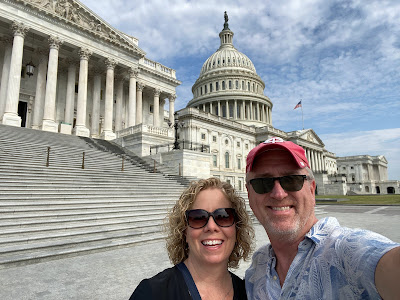 |
| Much nicer with none of the security fencing that was needed after the January 6th Attack on the Capitol. |
 |
| Lovely dinner with 4/5 of the Team in Washington. |
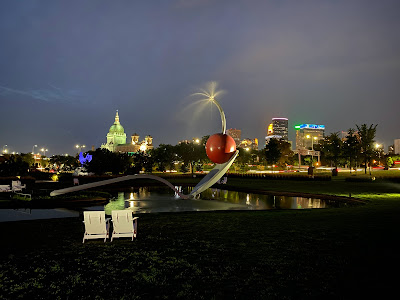 |
| Home. |
 |
| Our Dishy's new place in St. Paul. |
 |
| The best people. Bloomington |
 |
| Also the best people. Minneapolis |
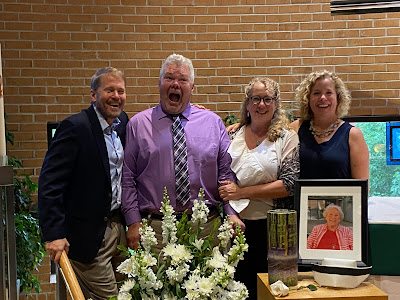 |
| Barb's Memorial Service in Madison, and Chris in his normal state. |
 |
| Dear friends Ron and Deb (also the best people) made a special effort to stop in Madison for Barb's memorial and meet the family. Barb would have loved them, just like we do. |
 |
A massive summer thunderstorm chased us from
our celebration in the park to the hotel lobby. |
 |
| The family homestead in Madison, 1959 to 2015. |
Italy with Tommy and Jenna
October 2021: Bologna and Venice; November 2021: Rome
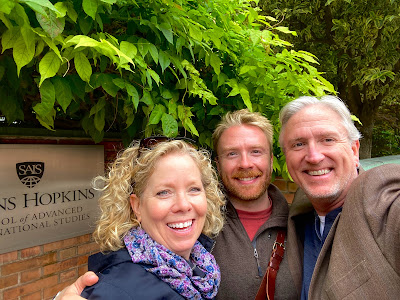 |
| So proud of our boy!! |
 |
| About to board a vaporetto in Venice. |
 |
| The Coliseum. |
 |
| November birthday celebrations in Rome. |
 |
| Tossing coins into the Trevi Fountain. |
January 2022: Brussels, Ypres, Henri Chappelle American Cemetery and Ardennes American Cemetery (photos will be posted later)
 |
| Posing in front of the Manneken Pis in Brussels, a wee little fella with an endless bladder problem. |
 |
| Enjoying fresh Belgian frites. |
May 2022: Bologna
 |
| Perfesser Spritz expounding on ... something important, to be sure. |
 |
| Nothing beats an Aperol Spritz and apertivo on the piazza with your boy, except a Spritz and apertivo on the piazza with the entire Team. |
 |
| Lovely pre-graduation (from the Bologna portion only) lunch. |
 |
| Heading back to his apartment to pack for his return to Jenna and the Websterino (that's his Italian name lol). |
 |
| The least fun part of such visits. |
March 2022: Santorini, Hydra, Athens
 |
| Windy, chilly day at the Acropolis. |
 |
| Rooftop bar view of the Acropolis, which is much better than this terrible photo. |
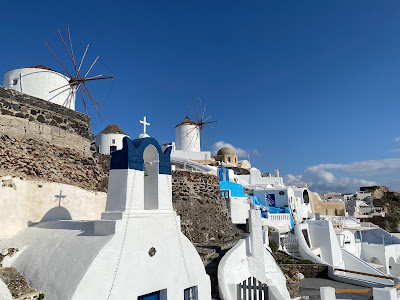 |
| Windmills and hillside village of Oia overlooking the Aegean. |
 |
| View from our little balcony. Oh my. |
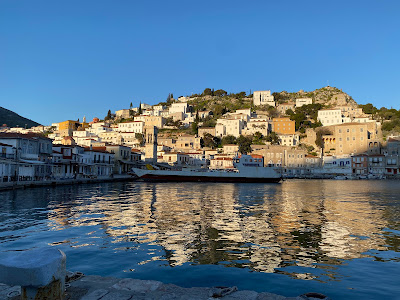 |
| Island harbor village, about one hour by ferry from Athens. |
Paris with Tommy and Jenna
and the first leg of R&R #1
March 2022: Paris, Normandy, Marrakech, Fez, Seville, Granada, Cordoba
 |
| These two allowed us to tag along a bit on the tail end of their trip together. |
 |
We had a lovely three days together.
|
 |
| In front of "Le mur des je t'aime" in the Jehan Rictus garden in Montmartre, Paris, with "I love you" written 311 times in 250 languages. |
 |
| Sacre Coeur de Montmartre, Paris. |
 |
| Enjoying an after work happy hour in Paris with good friend and colleague Elena. |
 |
He's the best puppy in the world, besides Riley and Webster. (March at the Bernard Lebrec Cidre and Calvados Brewery in Englesqueville-la-Percee, Normandy)
|
 |
| The Bernard Lebrec Cidre and Calvados Brewery in Englesqueville-la-Percee on the Normandy coast, site of a military hospital in the months after D-Day, and owned by the same family since the 1700s. |
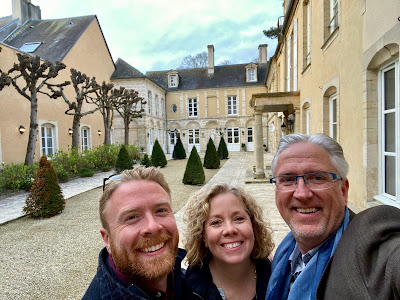 |
| Our lovely hotel courtyard in Bayeux. |
Morocco Trip: second leg of R&R #1
March 2022: Marrakech and Fez
 |
| Interesting characters selling water in Jemaa el-Fnaa, the main square in central Marrakech. Today they mostly provide atmosphere and sell photos with tourists like us. We did not drink the water. |
 |
| Open-air leather tannery in the Bab Debbagh district of the medina in Marrakech. Medieval-era hand-tanning techniques using solely natural elements continue into the 21st century. Tours can often be a scam, so if you go hire a guide through you riad or hotel. The smell is stupendous, so be prepared. |
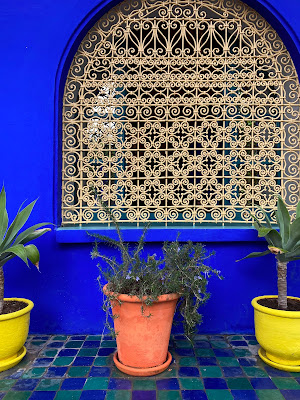 |
Intense blue in the Le Jardin Majorelle, a two acre botanical garden in Marrakech restored by Yves Saint-Laurent and Pierre Berget. After Yves Saint-Laurent died, his ashes were scattered in the garden.
|
 |
| The main western gate into the Fez medina built in 1913 at the start of the French colonial period, replacing an older, less ornate version. |
 |
| View of the ruins of Volubilis, UNESCO World Heritage site of the southwestern-most point of the Roman Empire built on an even more ancient Phoenician city. Dating from the 1st century CE, these ruins include a Capitoline Temple, triumphal arch, mosaics, and the remains of houses and offices. Wild flowers are marigold calendula, and are found everywhere in this area at this time of year. Outside Fez. |
 |
| Ancient Basilica of Volubilis. |
 |
| Roadside lunch stand. |
 |
| Ready for our lunch adventure! Wheeeee! |
 |
| Grilled up it wasn't too shabby, maybe a little less tender than we like it, but tasty all the same! |
Spain Trip: third and final leg of R&R #1
April 2022: Seville, Granada, Cordoba
 |
| Beautiful gardens in the Real Alcazar, a palace built for the Christian king Peter of Castile on the site of a former residential fortress (alcazar) for a Moorish Muslim leader, the original of which was destroyed in the Christian conquest of Seville in 1248 CE. |
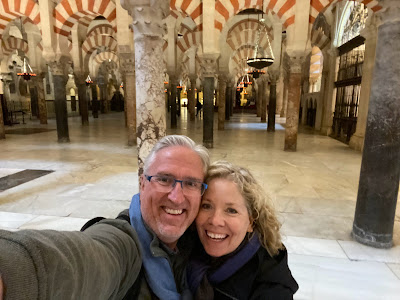 |
| Massive and ornate interior of Cathedral of Our Lady of the Assumption, also known as the Great Mosque of Cordoba, which dates from 785 CE when the mosque was ordered built, and then in 1236 CE was converted into the Cathedral after the Reconquista. |
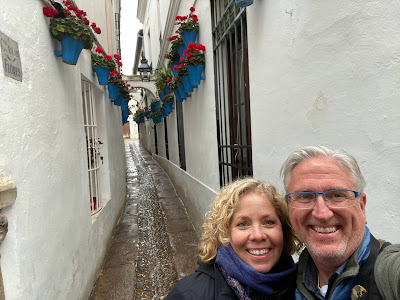 |
| Calleja de las Flores, a narrow and picturesque "street" flanked much of its length with its namesake flores. Cordoba. |
 |
| We were in Spain a little early for Semana Santa de Seville (Holy Week in Seville), but the preparation of the massive and elaborate and unwieldy floats were well under way. Some floats weigh enough that 40 men are needed to parade them around Seville in procession and celebration of Easter. This is the float is of the Weeping Virgin (Virgen de la Macarena, aka La Esperanza), is housed in the Basilica de la Macarena and weighs 1.5 tons! (One float of Cristos weighs nearly 3 tons!) She sports real crystal tears and hundreds of real, honest to God candles. |
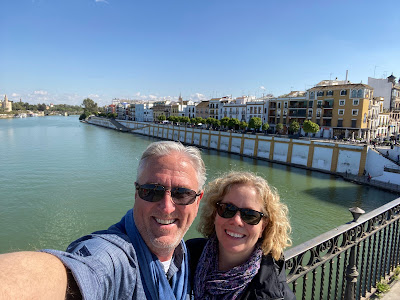 |
| Bridge of the River Guadalquivir looking at the quaint Triana neighborhood. Seville. |
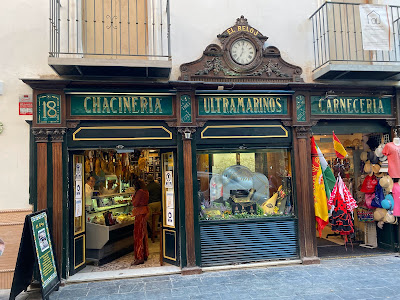 |
| Our new favorite shop for Spanish apertivo in Seville! Super small, it holds about ten customers max, and you sit right in front of the deli counter chatting with the proprietors while they fix you plates of olives and slice jambon. Listening to the guys argue with the three or four customers was like eavesdropping on old friends involved in good-natured ribbing, and soon one stopped by our table and bought us a tasty plate of Spanish sausage. So much fun! |
 |
| We booked an all-day bus trip to the Alhambra, another UNESCO World Heritage Site, located in Granada. Another simply spectacular hilltop fortress complex, it contained at least six major palaces, and is one of the most famous examples of Islamic architecture in the world. Construction began in 1238 CE, and was built on an early Muslim fortress dating from the 11th century CE. In 1492 CE, the site became the Royal Court of Ferdinand and Isabella (yup, that Ferdinand and Isabella), and Christopher Columbus received his royal endorsement in this palace. Simply amazing. This is the Court of the Myrtles, the central courtyard of the Comares Palace portion of the Alhambra. |
 |
| The Patio de la Sultana water garden in the Generalife, a summer palace just east and on the same general property as the Alhambra fortress complex. |
 |
| One of the many exterior gardens in the Alhambra fortress complex. |
 |
| Since this was an all-day trip, we wouldn't have time for dinner prior to our bus trip back to our hotel in Seville, so we improvised by wolfing down McDonalds cheeseburgers in the bus station. (I know, I know, it's like sacrilege to eat McDs in Spain, but we only had about 30 minutes before our bus left!) We also had a nearly three hour bus ride ahead of us, which would put us back at the hotel too late for our free glass of wine in the hotel lounge, so we bought a bottle and two containers of water and then made the water into wine for our bus ride home! Old college tricks sometimes come in handy lol. |
 |
| Plaza de Espana in Seville, built in 1928 for the Ibero-American Exposition, the space has been renovated and now houses many government and other offices. |
 |
| From an alcove on the second floor of the Plaza de Espana. |
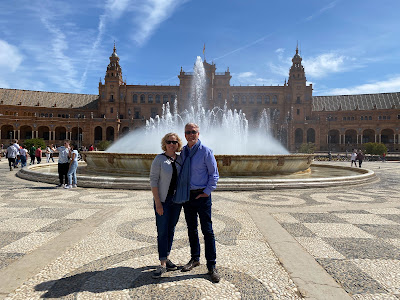 |
Fountain in the center of the Plaza de Espana.
Ireland Anniversary Trip |
May 2022: Galway area, Dingle Peninsula, Kinsale, Dublin
 |
| For our 33rd Anniversary trip to Ireland, our first time to the Emerald Isle, we rented a 1968 MG Roadster, a four-speed manual transmission convertible. It was quite the ride! |
 |
| Cronin and Garvin, two massive Irish Wolfhounds were allowed to help walk during our stay at Ashford Castle. |
 |
| The Cliffs of Moher, along the Wild Atlantic Way. |
 |
| Our sweet little ride is a four-speed manual transmission that — like me — doesn’t really like to start when cold, so has so far required a push to a nearby incline so as to pop the clutch every.single.time. I swear I didn't force my lovely bride to do this every time!! |
 |
| The only time we had the top down as it wasn't quite warm enough most days, and this little car makes more noise than one would expect. |
 |
| In one of the many pubs of the Temple District having a Guinness with nephew Andrew who lives in Ireland. |
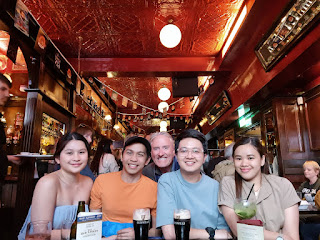 |
| I pulled of perhaps the greatest photo bomb in history at the Temple Bar. We were just enjoying our own Guinness when the four young people at the table next to us placed a phone on the window across the table for a selfie. I happened to look over and see what they were up to a few seconds before the timer went off, popped over with alacrity and leaned down without them even noticing I was there. Their reactions when they reviewed the photo were priceless!! They were good natured about it, and we had a good laugh together. I asked for a copy and they sent it to me on the spot. |
Sorry for the epic photo overload... :)
|
Domestic travel within Turkey
was quite a bit easier and less stressful, as all the relevant information
(vaccination and negative testing status) was tied to a QR code on your cell
phone that linked each person with the Turkish Ministry of Health. These codes were used to gain entry to many
places within Turkey and were critical for contact tracing if someone tested
positive. As a result, as long as one
didn’t test positive for Covid and practiced all the health and safety
requirements, transportation around the country was fairly easy by summer
2021. We took advantage of that ease of
travel as well, and made trips to Cappadocia to see the amazing otherworldly
landscape from a hot air balloon; traveled to the coastal town of Çeşme and had
a day trip to the ancient Greek ruins at Ephesus (from the 10th
century B.C.E. and a UNESCO World Heritage Site); made an overnight trip to the
town of Safronbolu which is well known for its Ottoman-era homes and
architecture and is another UNESCO World Heritage Site; and finally flew to the
south to visit Pamukkale (you guessed it, also a UNESCO World Heritage site
known for its also otherworldly travertine formations) and the ancient cities
of Hierapolis and Aphrodisius.
Turkey is really an amazing
place, and if it’s not on your travel bucket list, I highly encourage you to
reconsider that position: It has amazing
history, fantastic archeological sites, excellent weather, a long and beautiful
coastline on the Mediterranean and Aegean Seas, the nicest people, and delicious
cuisine. Plus, the exchange rate against
the U.S. dollar and other major currencies makes Turkey quite affordable.
Cappadocia
July 2021
 |
| From the air over Cappadocia, an amazing adventure if you're game! |
 |
| Simply incredible geologic formations among the 60 or so other hot air balloons in the sky that morning. |
.heic) |
| A once-in-a-lifetime experience, among more than a decade of once-in-a-lifetime experiences. This was the view from our hotel balcony at dawn the day after we flew. |
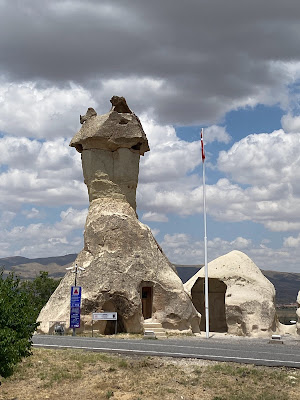 |
| This is a police station. No kidding. The otherworldly features are an amazing effect of geology, weather, and time. This is in Göreme National Park. |
 |
| Camel! Göreme National Park. |
Ephesus
August 2021
 |
| Ancient Roman Library of Celsus, dating from the 2nd century CE. |
 |
| There are two traditions for the location of the final resting place of Mary Mother of Jesus, one in Jerusalem and one in Ephesus, Turkey. The Turkish tradition concludes that Mary spent the last years of her life with St. John here in Ephesus. The Jerusalem tradition may have stronger archeological and archival evidence, but that does not stop modern-day pilgrims from making the trip, like this Ethiopian Christian woman. |
Pamukkale
February 2022
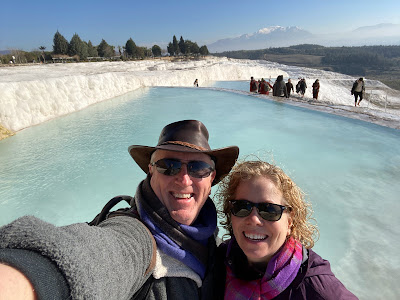 |
| Pamukkale ("Cotton Castle" in Turkish) is a small town in Western Turkey that is famous for its travertine terraces and carbonite mineral-rich waters that flow down them, adding to the structure over time and making them look like snow or cotton, with water that is a beautiful, light turquoise color. Protected and restored by removing some of the structures built in the 50s and 60s, which damaged much of the travertine, the only place to enter the thermal waters on the actual travertine is along one path running from the top to bottom. We were there in February, and the weather was not super cold, but certainly not warm. The water wasn't super hot, but warm enough to walk barefoot down the length along something of an uneven pathway that had no railing (of course). Clearly we made it safely or you wouldn't be reading this, if you even are lol. |
 |
| Adjoining Pammukale's travertine terraces is the ancient Greek-then-Roman city of Hieropolis, built here to take advantage of the hot springs that made the travertine terraces. This is the theater, which had a capacity of 15,000, and Hieropolis boasts a large number of necropolises, a Temple of Apollo, a Plutonion, and a Nymphaeum, among other ancient structures. |
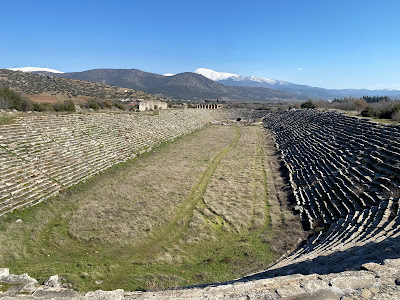 |
| About a hundred miles or so from Pamukkale is UNESCO World Heritage Site of Aphrodisias, a Greek city named after Aphrodite. The Temple of Aphrodite dates from the 3rd century BCE, and this is the Stadium which had seating for 30,000, and remains one of the best preserved of its kind in the Mediterranean. |
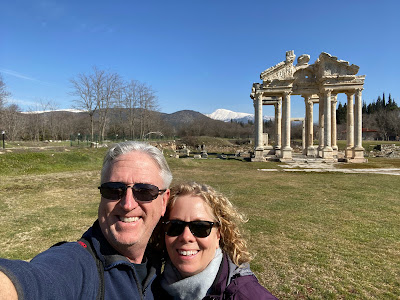 |
| The Tetrapylon in Aphrodisias, which means "four gates" in Greek, was a Monumental Gateway at the end of a road, and was built in about 200 CE. |
And of course, none of the above
includes the phenomenal city of Istanbul, with history and culture simply
oozing out of its pores. The city and
country have a very well-developed tourism industry, so travel here is really
quite easy, even if you find yourself intimidated by the challenging language
and exotic culture. We’re here one more
year, so make your plans and we’ll see the million or so tulips in full bloom each
spring in Emirgan Park, just a short walk from our apartment; have a fantastic Türk
kahvaltısı // Turkish breakfast
at one of our favorite little restaurants; witness the amazing sight of
thousands of the faithful at Friday prayers at Hagia Sophia; visit the Saturday
pigeon market where men buy and sell “flipping pigeons,” domesticated pigeons
raised for show and competition; take a ferry boat ride across the Bosporus and
have lunch in Asia; or any number of other fantastic and memorable
activities. We’ve honed our travel guide
skills and will make the trek worth your efforts. You’ll make a lifetime of unforgettable
memories in whatever short time you decide to spend here.
 |
Breakfast for six, please! Türk kahvaltısı (this one at our favorite place, Privato) is an incredible feast for the eyes and of course for the stomach. Many dishes (as evidenced by the above) of savory and sweet, olives and spicy tomato paste, honey and clotted cream, homemade bread and traditional Turkish bread ring (a bit like a sesame bagel) called sımıt, together with fresh juice, water, Turkish coffee, and endless tea. You won't need to eat for a week afterwards.
|
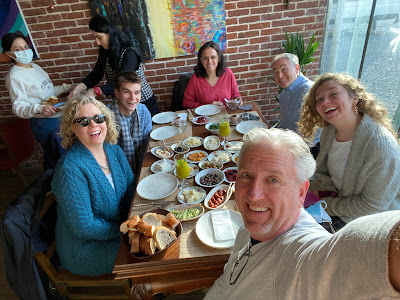 |
| We go to Privato often, and if you come, we'll be sure to take you, too. Here we are with some of the best people on the planet, the Langs, Dishy, and Nephew Andrew. |
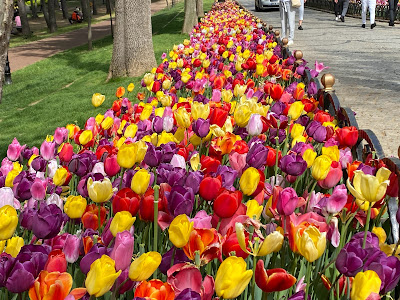 |
| An incredible array of beautiful tulips in Emirgan Park, not far from our apartment. |
 |
| They must plant several million bulbs in the garden each fall, then pull them after the bloom as ended. It's nuts! |
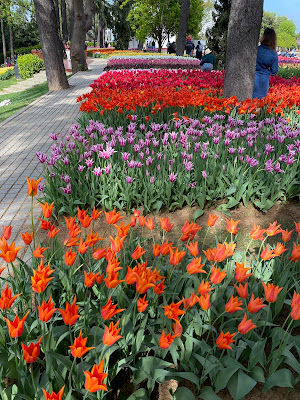 |
| The number of different beds is endless, as well. |
 |
A favorite series of beds, of which there are several similar ones nearby.
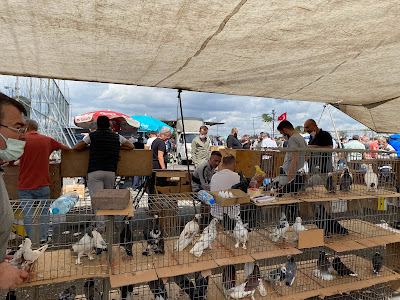 | The Saturday pigeon market, and some of the "flipping pigeons," some of which sell for upwards of 500 Turkish lira per bird (at the time, about $50 or more at the time.
|
|
 |
| We happened upon Hagia Sophia one Friday, just in time for noon prayers. The cavernous interior was full, so this is the spillover in the very large outside plaza. |
 |
| As we approached cautiously, professional tour guides and other locals could see us reacting hesitantly, but assured us there was no harm in observing or even taking a few photos, and we wouldn't offend anyone. |
Speaking of Visitors
2020 and most of 2021 were a
complete wash for visitors, for obvious reasons. By late last year, the pipeline of visitors
began to open up a bit, also a result of relaxed restrictions. Colleagues visited Istanbul from Sofia,
Bulgaria (just a half-day road trip), Cote d’Ivoire, and Nigeria; Sophie came
to visit at Christmas together with cousin Andrew, who currently lives in
Dublin; Tommy came for a long weekend from Bologna at Easter, along with good
friend and old college roommate Al who was making his second trip abroad ever
(the first being a 1980s era summer spent in Jakarta, Indonesia); some of our
best friends in the world, Mark and Sue from back home in Bloomington, stayed
with us in May; Sonja, the daughter of another old college roommate, stopped in
Istanbul for a few days at the end of a long European tour, and we enjoyed a
lovely dinner together overlooking the Bosporus; and more of our best friends
in the world from back home in Bloomington, three couples, arrived in late May
for a week of unbelievable weather and more fun, laughs, and camaraderie than
should be legal; and finally (for now), Kate’s sister Amy visited for a few
days after they spent a week together touring around England.
It's been a busy 14 months of
personal travel and visitors, so plan ahead and reach out if you are interested
in visiting: the schedule fills up
fast! 😊
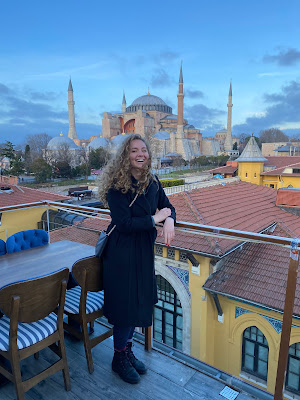 |
| Dishy overlooking the Hagia Sophia, from the balcony of one of our favorite stopping-off places. |
 |
| With nephew Andrew inside the Hagia Sophia. |
 |
| Christmas with family and friends! |
 |
| Al comes for a visit, and wants to fly on "Köfte Airlines." Köfte in Turkish means meatball lol. This is an old airliner converted into restaurant space. |
 |
| On the ferry to Asia with Mark and Sue! |
 |
| Mark and Sue with the Yeni Camii (New Mosque) in the background. |
 |
| Sonja and her friend Chloe stop in for a visit and join us and the Langs for dinner! |
 |
| The Bloomington Bums at Galata Tower, overlooking the Golden Horn. |
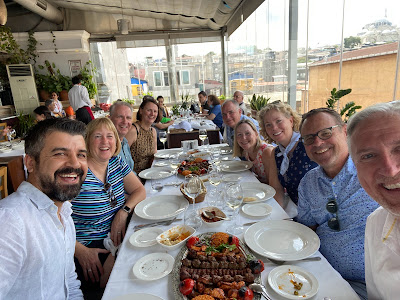 |
| The Bloomington crew having lunch with Omer Salman, "our carpet guy." |
 |
| Kate and Amy in the Rüstem Paşa Mosque. |
 |
| Amy joins us for a tour of the Bosporus! |
Independence Day // Bağımsızlık Günü
Every day when I arrive at work, I take an elevator up to the long, skyway-like hallway that connects to the entrance of the main Consulate building. As I exit the elevator, I’m met with a remarkable view of the sun rising over the Bosporus about a mile distant, which is immediately followed by a glance to my left to see the large US flag flying over Consulate grounds. It is my daily reminder of the incredible opportunities I have to serve my country in such an extraordinary place as Istanbul.
 |
| United States Marine Corps Color Guard "Posting the Colors." |
My job here involves working
with the local population to advance US foreign policy goals. As Cultural Attaché, I engage directly with
leaders in both K-12 and university-level education, as well as with those in
all cultural realms such as art and historical museums, professionals in music,
literature, fine art, and more.
In just one example of this,
over the past many months a small army of us planned and carried out the annual
Independence Day celebration on the grounds of the Consulate General in late
June. Our timing (i.e., not on July 4) was
dictated in part by the departure of the previous Consul General, scheduled to head
home begin preparations for her next post in Mexico, and the desire of the Ambassador
and his wife to host a particular musician and band with Arizona connections.
At many Embassies and Consulates
around the world, the Independence Day celebration is a massive undertaking,
involving virtually every element of our operations, and is one of the premier
representational events of the year. My team
and I were responsible for coordinating between the band, the program office
(American Music Abroad) in Washington, the Embassy in Ankara, the various key
team members from our Consulate, and outside partners here in Istanbul, all to
ensure the travel and programming of the band while they were in our city.
The Jacob Morris Band (find
Jacob at https://www.jacob-morris.com/)
arrived in Istanbul a few days prior to our event on June 27. None of the band members had ever been to
Turkey, and in fact one band member had never traveled internationally and had
never possessed a passport, another detail which had to be managed by our team
here and in Washington due to the tight turn-around time needed for him to be
able to travel. With some mild
assistance from us in the form of suggested sites to see, they had a few days
to rest and be tourists in a country and a culture they knew little about. Always a bit unnerving to basically hire an
official visitor to come and then “let them loose” in the city with no
supervision, these four young men were awed by and appreciative of the history
and culture here. They recovered well
from their long trip, and on Monday morning we met them at the hotel to start
their official activities.
First up was a masterclass held by Jacob Morris – namesake, lead singer, and
musician – at a local university music conservatory. While school is out of session, we managed an
audience of perhaps 20 or so people, a couple of graduate student musicians as
well as staff and faculty, and Jacob did a fine job. After introducing him to local delicacies at
a nice restaurant nearby, we prepared for the main event of the day: A free performance at an old, renovated
brewery that now hosts a number of small restaurants, a craft brewery, exhibition
and performance space, and a large and lovely outdoor courtyard in the midst of
it all, complete with a concert stage and lighting. The band played a 90-minute show as the sun
set over the city, and Jacob was interviewed by a national TV station beforehand,
so despite the somewhat smaller crowd who were deterred from attending by
threats of rain (which never materialized), it was a great success. To top it all off, six of our good friends
from Bloomington were all visiting that week, and Kate brought them all to the
venue so they could have some brisket and beer and enjoy the concert as
well. Their presence, and their support
for what my colleagues and I work to do every day, was really quite wonderful.
 |
| Jacob Morris and the band playing at Bomantiada. |
The main reason for bringing
Jacob and the band to Turkey, however, was for the Fourth of July, which we at
the Consulate celebrated the next day. Dozens of American corporate sponsors not only
provided the funding needed but set up booths around the perimeter of the
Consulate ceremonial entrance to the building and provided partygoers with unlimited
donuts (Krispy Kreme), cheeseburgers (Burger King), café lattes (McDonalds),
pizza (Little Caesars and Dominos), and margaritas (TGI Fridays), among quite a
few other American “delicacies.” Harley
Davidson brought a few bikes to show off, and also had an all-beef hotdog stand
(pork is hard to find and probably wouldn’t have been appropriate to provide in
this overwhelmingly secular Muslim country).
The Four Seasons hotel chain made enough cake for our 900+ guests, and
other vendors provided fresh flowers, the concert stage and sound system, and
much, much more.
Being that it is the Fourth of
July, there must be speechifying of course, and so our Turkish guests heard
from our outgoing Consul General as well as from the Ambassador, who was in
town specifically for this event. My
team and I contracted with a local Turkish singer to perform at the event as
well, and we coordinated with her and Jacob on the singing of both national
anthems during the opening of the event as the United States Marine Corps Color
Guard posted the colors. It’s all very
formal and can be quite moving, and the Marines – complete in their dress blues
– are one of the highlights. This year
they had a new addition to their team as one of the Consulate kitties decided to
make an appearance directly in front of the Marines as they posted the colors,
causing a me a few heart palpitations as I worried the little guy would decide
to plop down for a catnap directly in their path as they marched, and left me
poised to jump out in front of the Marines to scoop him up to avoid catastrophe. Fortunately, little Felix just ambled through
the parade ground, much to the delight of the crowd, and exited stage left
without incident. I was quite relieved.
The Turkish singer, Idil
Meşe (find her here on Instagram https://www.instagram.com/idilmese/?hl=en)
performed a nice 30-minute opening set prior to the start of the band, and then
Jacob, Wyatt, Josh, and Wesley took the stage.
Jacob and the band played a variety of songs over their 90 minutes on
stage, including several Jacob Morris originals, a few classic American rock
and country songs, and in a nod to the local Turkish audience, Jacob and Idil kicked off the second set with a duet that really had the audience
transfixed. Jacob’s repertoire included
no Turkish songs, but earlier in the day when resting and preparing, he and
Idil cooked up a compilation song blending John Denver’s Take Me Home Country
Roads with a very famous Turkish folk song that everyone in the audience knew. To really capture the hearts and minds of the
Turkish attendees, he even sang the refrain together with Idil, in Turkish. Given that he also does not know any Turkish,
even this small nod to the local people and their culture was huge hit.
My team and the band knocked
back a few cold beers after the event, managed a nice souvenir photo with the
entire Marine Security Guard contingent, and then we packed up the band and
sent them off the hotel so they could get a very early start the next day on
their road trip to Ankara, where they would essentially repeat the previous
several days at the US Embassy there.
What’s next? // Sırada ne var?
After two years in Turkey, we have reached the point where we start actively engaging in the process of deciding where we will go next (if it can be called deciding).
The four of you might recall
that about one year before the end of one tour we begin to lobby hiring
managers at onward posts of interest, searching our database to see what
positions are open, fit my rank and skills, are in interesting places, and fit
our own personal, professional, and family needs.
It’s an interesting exercise to
consider options in virtually every country on every continent, but the process itself isn’t all that
fun. While a job – a job of any kind –
will always be available, getting just the right job in the right place is a
challenge. It’s essentially like applying
for a new job every two or three years, but all with the same organization, and
requiring updates to resumes and other documents, sending carefully crafted
emails to the dozen or so places one finds interesting, arranging and then conducting
interviews, competing with colleagues also interested in those positions, and
then letting decision makers back in Washington and at post make the choice. The process is underway now, and will intensify
over the next few months until decisions are announced in about mid-October.
We’ll keep you posted.
Until Next Time
If you made it this far, I thank you. I hope it won’t be another year before the next edition arrives in your inbox and will try to be better in the coming months, especially with the news of the next post to share.
Tommy returned from Bologna in
mid-May and is back in Washington and reunited with Jenna and Webster. We were fortunate to have had the chance to visit
him three times during his year in Italy despite the pandemic and saw him and
his classmates the weekend before school ended for the year. Currently working as an intern at the Pentagon
for the summer, he will start is last year of grad school in the fall.
Sophie moved to a new place on the
west side of St. Paul about a year ago, and is still working for Fairview
Health Systems, the job she landed in the midst of the worst of the pandemic
back in 2020. We were lucky to have been
in town when she moved and so were able to lend a hand in getting her settled
in a nice neighborhood surrounded by St. Thomas University, St. Catherine’s
University, and Macalester College, with the Mississippi River to her west. It’s a great area, she has a good job, a great
roommate, and we are happy.
Riley lives a small, slow life,
but that’s not unusual for an old boy of twelve and a half, and he rarely leaves
our housing compound. But he’s not
without friends: Recently, Kate has
taken to feeding a few of the local cats that live here on the compound near
our place, and as she does so when walking The Wonder Dog, they now associate his
appearance with a generous feeding, and have become Riley’s Felinetourage, sometimes
following us for the entire walk. Unfortunately, no matter how often I tell them
that I am not the “food guy,” they insist on crying and mewing and asking for
food from me when Kate isn’t along to provide for them.
Kate has been working part-time
at the Consulate for more than a year, working in a position in our Management
Section that involves a small variety of tasks that aren’t very intellectually
stimulating, but at least provides a few dollars and allows her to have contact
with the wider Consulate community. It’s
not ideal, to say the least, as is often the case with Eligible Family Member (EFM)
employment. Remarkably, she belongs to
that shrinking group of people on the planet that has yet to contract Covid-19,
which is all the more remarkable as I had it back in late April when I suspiciously
contracted it just about four days after a visit from a group of Congressmen (called
a CODEL; more about those in the next edition) and their spouses who never wore
masks, even in small enclosed spaces like the van I shared with them a number
of times. I add that to the ever-growing
list of things for which we now can blame Congress.
My parents have been in their apartment
almost two years now, and since vaccinations and other measures helped keep Covid-19
rates low and general immunity has been achieved among the residents, things have
brightened up considerably for them, and they have a nice group of friends and neighbors
with whom they socialize regularly, which is a great relief for me.
Well, I’ve droned on long
enough, and hope I didn’t waste too much of your time. We’re smack in the middle of what we call the
summer transfer season, so there are many new faces at the Consulate, as
happens all over the world. That means
more trips out with new arrivals to share favorite cafes, Bosporus-side restaurants,
and rooftop bars, not to mention all the historic sites. If you come for a visit, we’ll be sure to add
you to the itinerary. Turkey is a travel
destination that eludes most Americans, for some reason. Ask any of our visitors about it and they’ll
tell you: Make it a priority to come
here.
All in all, despite my two-month
long recovery from Covid and a recent bought of campylobacteriosis, we are all
healthy and safe, and hope you can say the same.
-30-
The opinions expressed within are my own and not those of the U.S.
Government.
Please do not disseminate widely without permission.
.HEIC)



























































.heic)






















































.HEIC)
